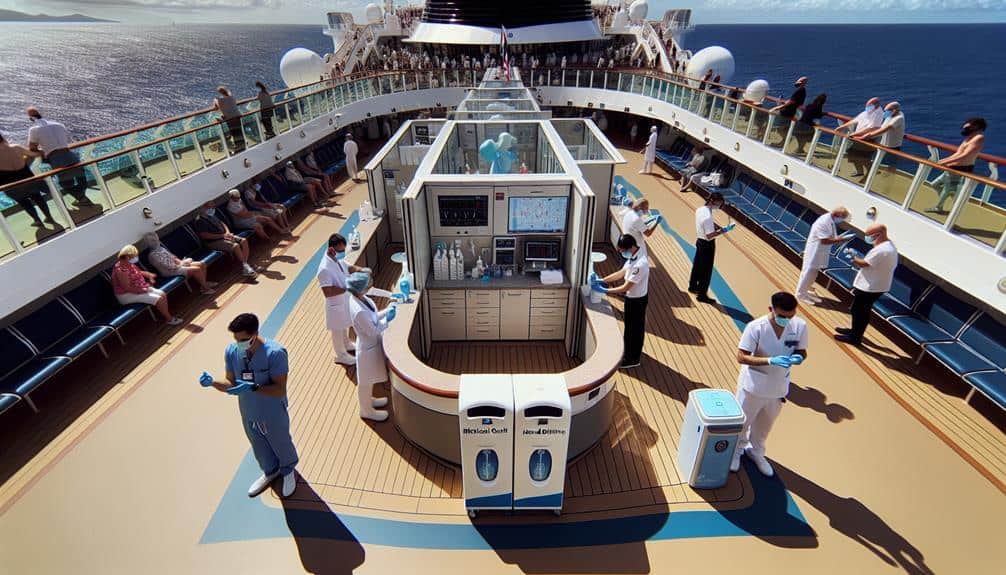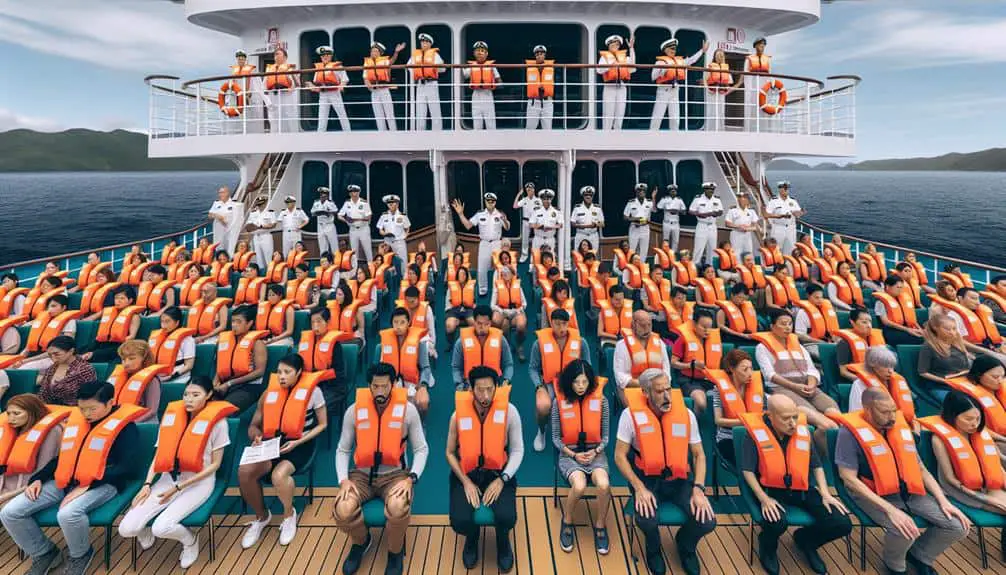Ensuring strict health standards on cruise ships is essential. Infectious diseases spread rapidly in the close quarters, emphasizing the need for robust health protocols. Your well-being hinges on stringent sanitation and health screenings aboard. Quick access to medical care prevents issues from worsening. Cruise lines must meet regulations to avoid legal troubles and protect their reputation. Proactive measures like thorough hygiene practices and monitoring passenger health are crucial. International compliance with health and safety standards is imperative. Maintaining these standards is key to passenger safety and public health.
Key Points
- Prevents infectious disease outbreaks through rigorous sanitation and health protocols.
- Safeguards passenger well-being with immediate medical assistance and screenings.
- Mitigates legal risks by adhering to industry regulations and safety standards.
- Ensures proactive implementation of preventative measures for public health protection.
- Maintains compliance with international health and safety standards for passenger and crew safety.
Risks of Inadequate Health Standards
Inadequate health standards on cruise ships can pose serious risks to passengers and crew members alike. Ensuring public health on cruise ships is essential in preventing the spread of infectious diseases. Cruise ships are unique environments where large numbers of people are in close proximity for extended periods, creating ideal conditions for the transmission of illnesses. Without proper health standards in place, infectious diseases can quickly spread among passengers and crew, leading to widespread outbreaks.
Public health agencies closely monitor cruise ships to prevent and control the spread of infectious diseases. Implementing and enforcing robust health standards is pivotal to safeguarding the well-being of everyone on board. Regular inspections, sanitation protocols, and medical facilities are essential components of maintaining public health on cruise ships. By adhering to stringent health guidelines, cruise lines can minimize the risk of infectious disease outbreaks and provide a safer environment for passengers and crew members.
Impact on Passenger Health
Passengers on cruise ships are directly impacted by the health standards implemented on board, influencing their overall well-being during the voyage. The implementation of robust prevention strategies, such as stringent sanitation protocols and health screenings, plays a vital role in safeguarding passenger health. These measures help mitigate the risk of infectious diseases spreading among passengers and crew members, ensuring a safer onboard environment.
In the event of health concerns, onboard clinics equipped with medical professionals and necessary resources provide immediate assistance to passengers. Timely access to medical care can address health issues promptly, preventing them from escalating and impacting the overall cruise experience. Additionally, onboard clinics offer a level of convenience and peace of mind for passengers, knowing that medical help is readily available if needed.
Legal Implications for Cruise Lines
Legal responsibilities faced by cruise lines encompass ensuring compliance with industry regulations and maintaining passenger safety standards. Failure to meet these standards can lead to serious liability concerns for cruise lines. When passengers suffer injuries or illnesses due to negligence on a cruise ship, they may file compensation claims against the cruise line. These claims can result in significant financial losses for the company, not to mention damage to their reputation.
Cruise lines must be vigilant in upholding health and safety protocols to mitigate the risk of facing legal repercussions. In cases where outbreaks of diseases occur onboard, such as norovirus or COVID-19, cruise lines can be held accountable for not taking adequate preventative measures. This can result in costly legal battles and compensation payouts to affected passengers.
To avoid legal implications, cruise lines must prioritize passenger safety, implement thorough health and sanitation practices, and adhere to all regulations set forth by governing bodies. By doing so, they can reduce the likelihood of facing liability concerns and compensation claims.
Importance of Preventative Measures
Guaranteeing the well-being of passengers on cruise ships requires a proactive approach to implementing thorough preventative measures against potential health risks. Extensive measures are essential to safeguard public safety and maintain high health standards onboard. Cruise lines must establish detailed protocols for preventing the spread of illnesses, such as enforcing strict hygiene practices, conducting regular sanitation procedures, and monitoring passenger health closely.
Prevention measures encompass various aspects, including proper food handling, disinfection of common areas, and isolation protocols for sick individuals. By adhering to these measures, cruise ships can minimize the risk of disease outbreaks and ensure a safe environment for all passengers and crew members. Implementing preventative measures not only protects public health but also upholds the reputation of the cruise industry as a responsible and reliable travel option.
International Regulations and Compliance
Adhering to international regulations and maintaining compliance with health standards is paramount for guaranteeing the safety and well-being of individuals aboard cruise ships. The cruise industry operates under strict international regulations to uphold health and safety standards.
Here are some key points to ponder regarding compliance challenges and industry guidelines:
- Global Standards: Cruise ships must adhere to global health and safety standards set by organizations like the World Health Organization (WHO) and the Centers for Disease Control and Prevention (CDC).
- Regular Inspections: Cruise ships undergo regular inspections to ensure compliance with these international regulations, focusing on areas such as sanitation, food safety, and medical facilities.
- Training Requirements: Crew members receive training on health protocols and emergency procedures to maintain compliance with industry guidelines.
- Documentation and Reporting: Detailed records of health incidents, sanitation practices, and medical supplies are kept to demonstrate compliance with regulations and guidelines.
Maintaining a high level of compliance with international regulations is essential for the cruise industry to safeguard the health and safety of passengers and crew members alike.
Frequently Asked Questions
How Do Cruise Ships Handle Medical Emergencies at Sea?
In managing medical mishaps at sea, cruise ships rely on their onboard clinics for quick care. Emergency procedures include skilled staff, well-equipped facilities, and coordination with local resources when needed. Safety is paramount.
What Measures Are in Place to Prevent the Spread of Infectious Diseases on Cruise Ships?
To prevent the spread of infectious diseases on cruise ships, passenger quarantines and strict sanitation protocols are enforced. These measures help contain outbreaks and protect the health of passengers and crew members onboard.
How Are Health Standards Enforced and Monitored on a Cruise Ship?
On a cruise ship, health standards are maintained through rigorous training protocols for staff and meticulous inspection procedures. Crew members are trained to uphold sanitation measures, while regular inspections guarantee compliance with health and safety regulations.
Are There Any Specific Health Requirements for Crew Members Working on Cruise Ships?
To work on a cruise ship, crew members must undergo rigorous training and possess medical certifications. These requirements guarantee a safe environment for passengers and staff. Crew training and medical certifications are essential elements for maintaining health standards onboard.
What Role Do Public Health Agencies Play in Regulating and Overseeing Health Standards on Cruise Ships?
Public health agencies provide regulatory oversight on cruise ships, ensuring compliance with health standards. They monitor sanitation, disease prevention, and emergency protocols, safeguarding passenger and crew health. Their involvement is essential for upholding safety at sea.




